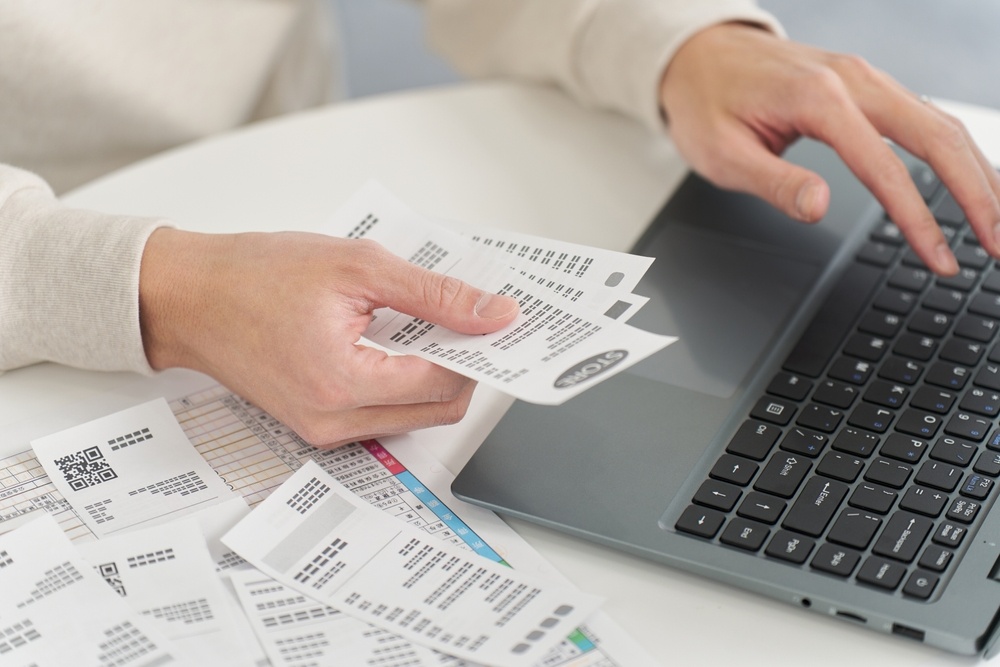As a small business owner, your receipts tell the story of your financial decisions—each one a piece of evidence that supports your deductions, tracks your expenses, and protects you in the event of an audit. But what happens when those records are incomplete, scattered, or missing? The result is often unnecessary stress, missed deductions, and even potential IRS scrutiny.
Effective receipt management isn't just about keeping the IRS at bay; it's about creating a financial foundation that streamlines tax preparation and empowers smarter business decisions. Every receipt, whether for a business lunch or a new piece of equipment, can save you money when tax season comes. But without a clear system for organizing and retaining them, valuable deductions can slip through the cracks, leaving your business with a higher tax bill and fewer resources to grow.
Using accounting software to track receipts throughout the year, you can present your tax preparer with clean, organized records. This reduces billable hours, minimizes errors, and ensures no expense is forgotten. This article will help you understand which receipts to keep, how long to hold on to them, and the best management practices—setting you up for financial success with minimal effort.
What kinds of receipts should I keep?
Every business transaction has the potential to impact your bottom line, but not all receipts carry the same weight. Knowing which receipts to keep—and why—can mean the difference between maximizing deductions and leaving money on the table. Here’s what to prioritize:
Keep All Business-Related Receipts
Any receipt tied to your business operations deserves a place in your records. This includes office supplies, client meals, travel expenses, and equipment purchases. These documents substantiate deductions, ensuring you comply with IRS rules and are prepared if questions arise. Even smaller transactions, like parking fees or tolls, can add significant savings when adequately documented.
Don't Overlook Digital Receipts
With online shopping and automated billing on the rise, many receipts never touch paper. Save email confirmations and digital invoices just as diligently as physical receipts. Use folders or cloud-based storage solutions, like Google Drive or Dropbox, to categorize and back them up for easy access during tax season or an audit. Apps like Expensify or QuickBooks can also automate receipt tracking, saving time and reducing human error.
Flag Significant Purchases Explicitly
Larger expenses, such as new equipment, lease agreements, or business renovations, warrant extra attention. These receipts often support depreciation schedules or justify long-term deductions. Tagging them in your system can save time and frustration when retrieving documentation later.
Properly managing receipts isn’t just about compliance; it’s about creating a system that protects your business and streamlines your workflow. Organizing records by expense category or date ensures you can quickly access what you need without digging through piles of paper.
How can keeping my receipts help me save money on my tax return?
Every receipt you save is an opportunity to reduce your taxable income. The IRS allows deductions for a wide range of business expenses. Still, with proper documentation, those deductions can easily be allowed. Here's how keeping receipts can maximize your tax savings:
Keep Meal and Entertainment Records
Business meals and entertainment expenses are frequently deducted but require detailed documentation. Include receipts and notes specifying the business purpose, who attended, and the date. For example, a client’s lunch may be 50% deductible, but you need the receipt to ensure you get this opportunity.
Capture Incidental Expenses
Small, easily forgotten expenses like parking fees, tolls, or office supplies can significantly increase over the year. Keeping receipts ensures these minor costs stay intact, leading to a more accurate and beneficial tax return.
Leverage Every Legitimate Deduction
Receipts serve as proof for deductions like mileage, travel, and even depreciation of assets. By maintaining organized records, you can claim every legitimate expense confidently, minimizing your tax liability while staying compliant.
Building a habit of saving and organizing receipts ensures you take advantage of tax savings opportunities. This simple step can lead to real financial benefits during tax season.
How can keeping my receipts save me if I ever get audited?
An IRS audit is a stressful prospect for any small business owner. Still, with proper preparation, it doesn't have to be. Organized receipts are your most vigorous defense, providing clear documentation to validate your claims and protect your financial standing.
Organized Receipts Support Your Claims
Each deduction on your tax return must be backed by documentation, and receipts are the gold standard for proof. Whether it's a meal expense, a travel cost, or a significant purchase, receipts demonstrate the legitimacy of your claims. Even valid deductions can be denied without them, increasing tax liabilities or penalties.
Demonstrate a Pattern of Diligence
The IRS pays attention to businesses that consistently and thoroughly record their transactions. Organized receipts signal that your business operates with integrity and financial discipline, which can help reduce the depth and duration of an audit.
Quick Access to Documentation
Time is critical during an audit. Receipts sorted by category, date, or expense type allow you to respond promptly to IRS requests, whether for proof of a specific deduction or validation of a significant transaction. Accounting software, like QuickBooks or Expensify, can streamline this process by storing and categorizing receipts for easy retrieval.
By maintaining a robust receipt management system, you safeguard your deductions and fortify your business against unexpected challenges. Preparation today can prevent costly disputes tomorrow.
How long should I keep my receipts?
The IRS sets clear guidelines for how long you should retain receipts, but exceptions can complicate this timeline. Understanding these rules ensures your records are sufficient to protect your business in any situation.
Follow the IRS’s Three-Year Rule
For most expenses, the IRS advises keeping receipts for at least three years from the date you file your tax return. This period aligns with the standard statute of limitations for audits, during which the IRS may request supporting documents. However, we recommend retaining them for at least seven years from the date you filed your tax return. This extended period covers any potential extended statute of limitations that might apply, making it your safest bet.
Retain Major Asset Records Longer
Keep receipts for significant purchases, such as property or equipment, for as long as you own the asset plus an additional three years. These records are essential for calculating depreciation or reporting capital gains if the asset is sold.
When in Doubt, Don’t Throw It Out
If you're unsure whether a receipt might be needed, err on the side of caution. Retaining records for up to seven years can provide additional peace of mind, especially for deductions related to bad debts or substantial understatements of income.
By adhering to these retention practices, you ensure that your records remain accessible and sufficient to meet any IRS requirements, no matter the circumstance.
How should I organize my receipts?
Organizing your receipts effectively is essential for maintaining accurate records and simplifying tax preparation. A clear system saves you time, reduces stress, and ensures you can access documentation when needed. Here’s how to get started:
Categorize by Expense Type
Group receipts into categories such as travel, meals, office supplies, and equipment purchases. This method simplifies tracking spending and linking receipts to specific deductions.
Date and Label for Easy Identification
Clearly label each receipt with the date and a brief description of the expense. For instance, a client lunch receipt could be tagged as "Client Meeting – 03/15/2024." This step ensures quick retrieval during tax season or an audit.
Use Consistent Filing Methods
Select a system that suits you, whether it's a physical filing cabinet or digital storage. Apps like Expensify or QuickBooks can automatically scan, categorize, and store receipts. Some banking apps even allow you to add notes or categories directly to transactions, creating a seamless record-keeping process.
By implementing an organizational strategy tailored to your needs, you’ll avoid scrambling for receipts at critical moments and ensure your records are always audit-ready.
The bottom line
Managing your receipts can be manageable. By implementing effective receipt management practices, you're setting the foundation for smoother tax preparations, maximizing your deductions, and gaining peace of mind in the event of an audit. Every organized receipt is a step toward greater financial clarity and stability for your business.
Consistency is key. Whether you categorize expenses, leverage digital tools, or develop a routine for saving receipts, these habits make a significant difference. It's not just about avoiding IRS headaches—it's about empowering yourself to make informed financial decisions that contribute to your business's success.
At DiMercurio Advisors, we understand the unique challenges small business owners face regarding financial management. If you're looking for personalized guidance on organizing your receipts or any other aspect of your finances, we're here to help. Contact us today to discover how our expertise can support your journey toward financial confidence and growth.








